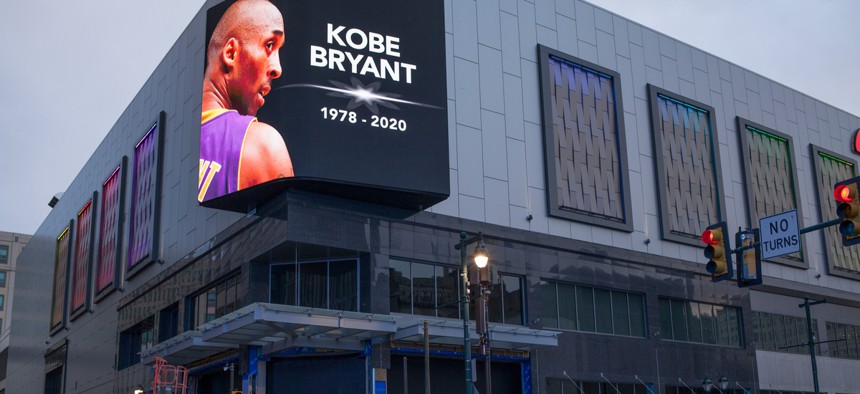Prompted by Kobe Bryant’s Death, California Makes it a Crime for First Responders to Snap Unauthorized Photos of Dead Bodies

A tribute to Kobe Bryant following his death. Shutterstock
After law enforcement officers who responded to the helicopter crash that killed the basketball superstar took photos of his body and shared them, California moved to make that act a misdemeanor.
First responders in California can now be charged with a misdemeanor if they take unauthorized photos of dead bodies at an accident or crime scene. The new law was prompted by images taken after the death of basketball player Kobe Bryant, who was killed in a helicopter crash near Los Angeles in January.
At the site of the helicopter crash that killed Bryant, his 13-year-old daughter Gianna, and seven other people, at least eight deputies with the L.A. County Sheriff’s Office, along with some firefighters, took pictures of the scene. When one of the deputies allegedly showed these photos to a woman at a bar, a bartender filed a written complaint with the Sheriff’s Office.
Starting January 1, taking photos "for any purpose other than an official law enforcement purpose” will become a misdemeanor with an attached fine of up to $1,000.
California Gov. Gavin Newsom signed the new measure into law on Monday, days after Bryant’s widow, Vanessa Bryant, filed a lawsuit against the L.A. County sheriff’s department over the photos taken at the crash site.
In March, Los Angeles County Sheriff Alex Villanueva said that the behavior of the deputies who took the photos was “inexcusable.” Villanueva said that he called the deputies into the station and had them delete the photos. “People are grieving for the loss of their loved ones. To have that on top of what they’ve already gone through is unconscionable,” he said.
But Villanueva said that what the deputies did wasn’t illegal and that it was a “significant deficiency” that such a law didn’t already exist. Although the law prohibited the reproduction of photographs officially taken at crime scenes or by coroners, there were no previous measures that barred first responders, including law enforcement officers, EMTs, or firefighters, from taking photos on their personal devices.
In her lawsuit against the sheriff’s department, Vanessa Bryant claimed that the sheriff “did not conduct a standard investigation” or properly inspect deputies’ phones to ensure that the photos hadn’t been sent to anyone else or posted on the internet. “The biggest threat to the sanctity of the victims' remains proved to be the Sheriff's department itself," as deputies "pulled out their personal cell phones and snapped photos of the dead children, parents, and coaches. The deputies took these photos for their own personal gratification,” the lawsuit states.
The lawsuit continues to state that Bryant “feels ill at the thought of strangers gawking at images of her deceased husband and child, and she lives in fear that she or her children will one day confront horrific images of their loved ones online.”
In response to the lawsuit, the sheriff’s department released a statement saying they fully supported the legislation to make it a crime to take unauthorized photos. “We continue to offer our heartfelt sympathies for the victims and their families,” the department said.
California assembly member Mike Gipson, the law’s sponsor, nicknamed it the “The Kobe Bryant Act of 2020.”
“Like many others, I was mortified after I’d heard that first responders captured and shared unauthorized photos from the scene of the helicopter crash that killed Kobe and Gianna Bryant, Payton Chester, Sarah Chester, Alyssa Altobelli, Keri Altobelli, John Altobelli, Christina Mauser, and Ara Zobayan,” said he said in a statement. “The actions of the first responders involved were unacceptable, and they highlighted a problem that demands a strong remedy.”
California is not the first state to create such a ban.
In 2011, Connecticut passed “Joshua’s Law,” named for Joshua Rogers, a young man who died of a drug overdose. A local police officer who responded to the call snapped pictures and shared them with others. The law imposes a fine of up to $2,000 or jail time up to one year.
New Jersey in the following year passed “Cathy’s Law,” named after car crash victim Cathy Bates. Before her family was aware of her death, a volunteer first responder posted photographs of her body to Facebook. The law in New Jersey imposes a $1,000 fine, includes a potential jail sentence of six months, and opens the person who took the photo to civil lawsuits from the victim’s family. The sponsors of the law there said the measure was necessary to prevent “shockingly irresponsible behavior and unforgivable lack of sensitivity.”
Emma Coleman is the assistant editor for Route Fifty.
NEXT STORY: The Federal Government Promised Native American Students Computers and Internet. Many Are Still Waiting.






